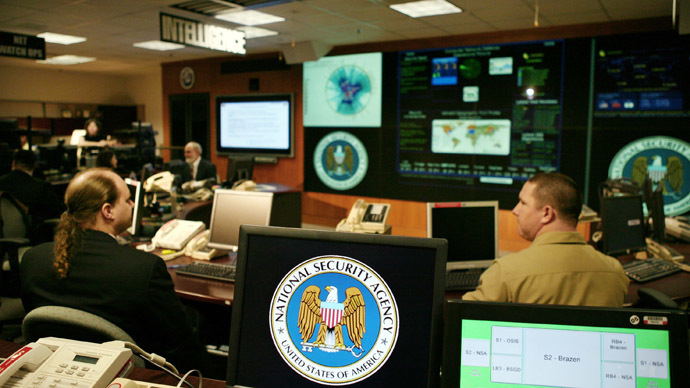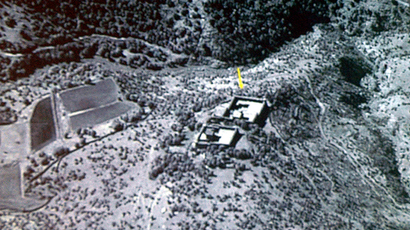NSA, no way! Anti-spying sentiments on the rise amid steady stream of disclosures

The National Security Agency isn’t making many friends, apparently: a new poll published this week suggests that a majority of Americans continue to have complaints with the NSA’s surveillance practices amid a myriad of recent disclosures.
According to the results of survey released this week by the Associated Press and the NORC Center for Public Affairs Research, anti-NSA sentiment remains rampant in the United States more than three months after former intelligence contractor Edward Snowden first began disclosing top-secret documents exposing the inner-workings of a vast surveillance apparatus operated by America’s premier spy agency. Meanwhile, concerns regarding those practices are growing amid members of Congress and even independent coalitions.
Polling conducted by the AP and NORC last month and released on
Tuesday suggest that 56 percent of Americans surveyed oppose the
NSA’s collection of telephone records, and 54 percent said they
were against the practices that put Internet metadata into the
hands of federal investigators.
A poll confused earlier this year in July by the PEW Research
Center found that 44 percent of Americans disapproved with the
NSA program, with half of the country not opposing the
surveillance methods.
Now only 34 percent — or roughly one-third of those polled — say they are okay was the dragnet collection of metadata, or raw information including information on the sender and recipient, time and location pertaining to emails and phone calls. Additionally, 53 percent of Americans polled from a group of 1,008 adults say the federal government is doing a good job of ensuring freedom, a drop in seven percentage points since 2011. That earlier study concluded that 40 percent of Americans thought the government was doing a good job of protecting privacy, and today that number is down to 34 percent.
The AP poll also concluded that an overwhelming 71 percent of those asked opposed US officials eavesdropping on calls without warrant, and 62 percent said they were against the monitoring of email content.
Results from the latest poll were published on Tuesday, one day before the UK’s Guardian newspaper published the latest top-secret document in a series of classified leaks attributed to Snowden since early June. On Wednesday morning, the Guardian published a NSA memo from 2009 in which its revealed how US intelligence officials have shared raw data collected from American persons with Israeli counterparts without domestic agents even analyzing that information before it changes hands.
Commenting to the AP, Trevor Timm of the Electronic Frontier Foundation suggested the recent NSA disclosures undoubtedly have influenced the public’s perception of the US intelligence community and the way it conducts itself.
"For the first time, the public is able to see what's going on behind closed doors and it's changing minds," Timm told the AP.
The EFF, along with the American Civil Liberties Union and more than two dozen other entities, are named as plaintiffs in a collection of lawsuits challenging the Obama administration’s surveillance programs. Attorneys for the EFF are representing plaintiffs in the matter of First Unitarian Church of Los Angeles v. NSA, which grew in size this week when five new organizations signed on to sue the White House. The EFF announced on Tuesday this week that Acorn Active Media, the Charity and Security Network, the National Lawyers Guild, Patient Privacy Rights and The Shalom Center have all signed on to the suit, which attorneys say challenges the government’s surveillance alleged abuse of Section 215 of the Patriot Act to collect bulk telephone metadata — an activity first disclosed on June 5 after Snowden leaked documents to the Guardian and Washington Post.
"The First Amendment guarantees the freedom to associate and express political views as a group," EFF legal director Cindy Cohn said in a statement. "The NSA undermines that right when it collects, without any particular target, the phone records of innocent Americans and the organizations in which they participate. In order to advocate effectively, these organizations must have the ability to protect the privacy of their employees and member
Also signing on in support of NSA reform is US Rep. Darrell Issa (R-California), who only this week announced he’d be seeking changes in the way America conducts surveillance operations. Issa previously voted against a measure proposed by colleague Rep. Justin Amash (R-Michigan) which would have aimed to thwart the NSA’s now-infamous practices, but this week wrote a letter to Congress saying lawmakers on Capitol Hill should debate those policies once again as leaks continue to raise concerns.
"Now that it has been publicly acknowledged that the communications of Americans were included in the NSA's data collection program, likely violating their Fourth Amendment rights, Congress must respond in a manner that both increases the transparency of the agency's programs and reinforces the constitutional protections of our citizens," Issa wrote in a letter first published by Politico.
"We're very pleased that Chairman Issa supports our amendment," Amash spokesman Will Adams told US News & World Report. "If the Amash amendment does get taken up by the House and it does pass this fall, it will put pressure on the committees to start passing comprehensive reforms."
The Amash Amendment would have barred the NSA from using the PATRIOT Act provision at the center of First Unitarian Church of Los Angeles v. NSA to collect the phone records of all Americans. It was defeated in the House last month by a 12 vote margin.














